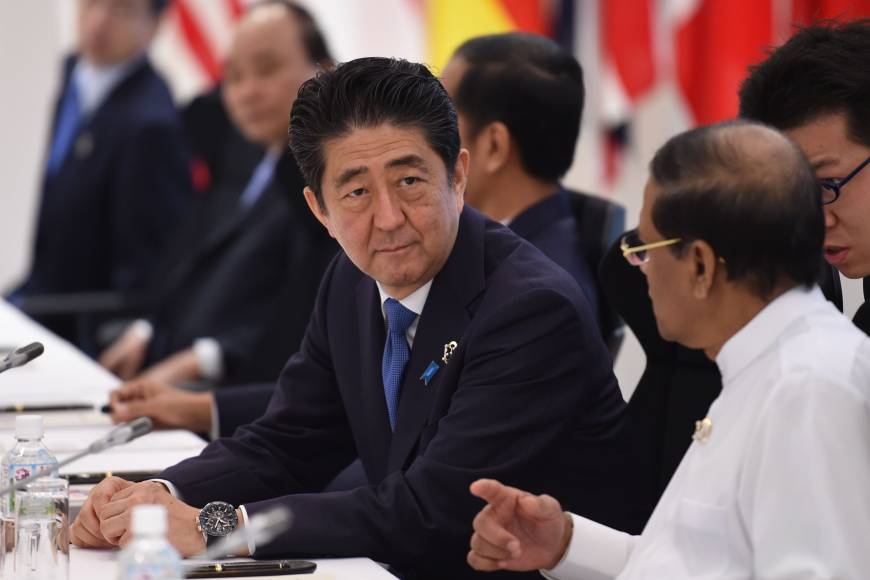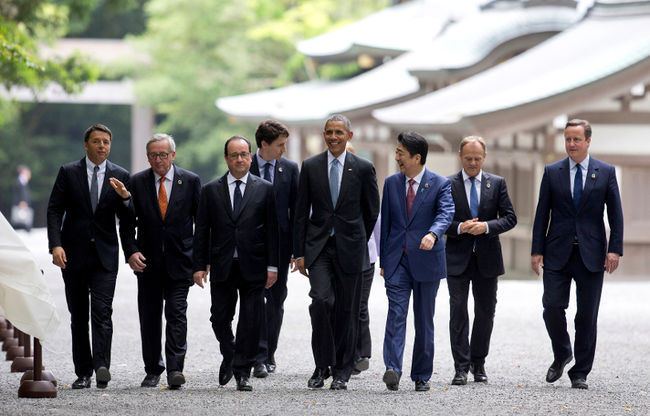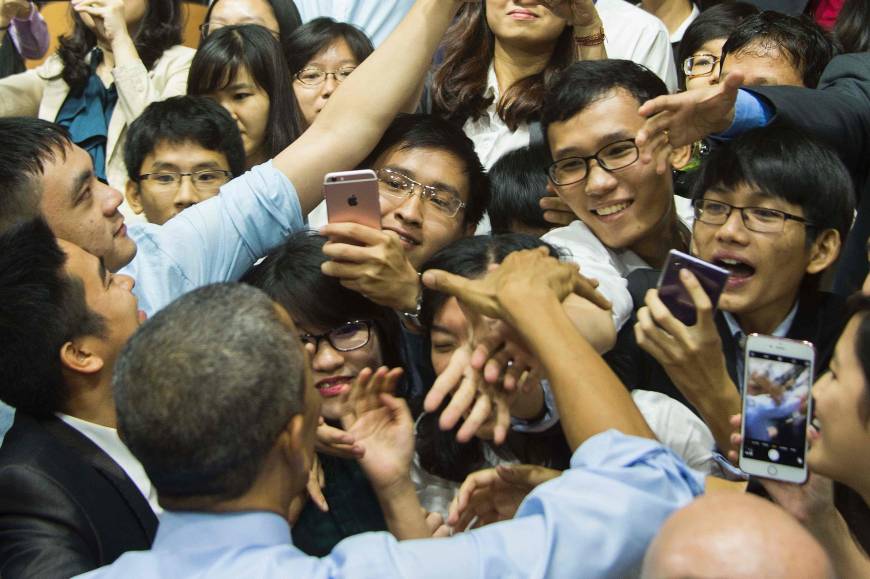
by Robert Whitcomb | May 27, 2016 | Event Updates
(May 30th, 2016) On May 27, leaders of the Group of Seven industrialized democracies meeting at their summit in Japan reaffirmed their commitment to swift implementation of the landmark Paris climate pact signed last year.

Prime Minister Shinzo Abe is seen with world leaders on Friday, the second day of the annual Group of Seven summit, held this year in Shima, Mie Prefecture
The Paris Agreement seeks to limit a rise in global average temperature to well below 2 degrees Celsius. The European Commission called it “the first-ever universal, legally binding” global climate framework.
“The G-7, continuing to take a leadership role, commits to taking the necessary steps to secure ratification, acceptance or approval of the Paris Agreement as soon as possible, and calls on all parties to do so, striving for a goal of entry into force in 2016,” the leaders said in a communique as the two-day summit drew to a close.
by Robert Whitcomb | May 26, 2016 | AI World Society Summit
The biggest issues at the G7 Summit have been how to get the global economy humming again; the refugee crisis in Europe and the Mideast; Chinese expansionism in the East and South China Sea, and cybersecurity. Read this link.
The last item has been a priority of The Boston Global Forum this year. BGF experts have presented their proposals on how to improve cybersecurity in particular and cyberbehavior in general to the G7 leaders. Indeed, a key part of the BGF’s BGF-G7 Summit Initiative is its Ise-Shima Norms for cyberbehavior, named for the location of the summit.
As for the refugees: European Council President Donald Tusk said on Thursday he would seek G7 support for more global aid for them.
“If we (G7) do not take the lead in managing this crisis, nobody would,” Mr. Tusk told reporters. A flow of migrants to Europe from Syria, other parts of the Mideast and Africa confronts the continent with its biggest refugee crisis since World War II.
In a closing communiqué, leaders were also expected to cite the importance of maritime security, including calling for respect for the rule of law and opposition to provocative acts that try to change the status quo by force – in a clear reference to Chinese expansionism.
Although full agreement on macro-economic policy looks difficult, the G7 leaders are expected to promote monetary, fiscal and infrastructure policies to spur growth in the final summit communiqué.
Britain and Germany are resisting calls for fiscal stimulus, and so Japanese Prime Minister Shinzo Abe will urge the G7 leaders to adopt a flexible fiscal policy, taking into account each country’s economic and political situation.
by Robert Whitcomb | May 26, 2016 | News
This report from security-ratings firm BitSight says that Brazilian companies do worse on cybersecurity metrics, such as machine compromise rates, e-mail security and file-sharing practices, than do companies in other major economies.
It made particular reference to those companies vulnerability to computers compromised by malware, such as botnets that covertly control a computer network.
by Robert Whitcomb | May 26, 2016 | News
In this podcast, Saker Nusseibeh, chief executive of Hermes Investment Management, said any benefits from a British exit from the European Union (“Brexit’’) would be limited while market anxiety from it could escalate into a wider economic contagion. He also discussed the Fed and the G7 meeting in Japan.

by Robert Whitcomb | May 26, 2016 | Initiative
(May 30th, 2016) China’s Defense Ministry asserted on May 26 that its aircraft followed proper rules after two Chinese fighter jets carried out what the United States called an “unsafe” intercept of a U.S. military reconnaissance aircraft over the South China Sea, where China has been seeking to gain hegemony, especially by occupying and militarizing some disputes reefs and islands.

File photo of a Chinese J-11 fighter jet seen flying near a U.S. Navy P-8 Poseidon about 215 km (135 miles) east of China’s Hainan Island in this U.S. Department of Defense handout photo taken August 19, 2014. REUTERS/U.S. Navy/Handout
The Pentagon said that incident happened in international airspace last week as the plane carried out “a routine U.S. patrol,” the Pentagon said.
A U.S. defense official said two Chinese J-11 fighter jets flew within 50 feet of the U.S. EP-3 aircraft, which was flying east of Hainan island.
Chinese Defense Ministry spokesman Yang Yujun asserted that the Chinese pilots acted professionally and in line with an agreement reached between the countries on rules governing such encounters.
However, he said the agreement, called the Rules of Behavior for Safety of Air and Maritime Encounters, could only provide a “technical standard,” and the best way of resolving the problem was for the U.S. to stop such flights.

by Robert Whitcomb | May 26, 2016 | Initiative
(May 30th, 2016) The Group of Seven (G7) leaders agreed on May 26 at their summit in Japan on the need to send a strong message to China about its maritime claims in the western Pacific, where an increasingly aggressive China has territorial disputes with Japan and several Southeast Asian nations. China has been seizing and militarizing some disputed islands and reefs in the region and threatening nations in the region that have challenged the seizures.

“Prime Minister (Shinzo) Abe led a discussion on the current situation in the South China Sea and East China Sea. Other G7 leaders said it is necessary for G7 to issue a clear signal,” Japan’s Deputy Chief Cabinet Secretary Hiroshige Seko told reporters after a session on foreign policy.
At a news conference late on Wednesday, Mr. Abe said that Japan welcomed China’s peaceful rise. But he repeated Tokyo’s opposition to acts aimed at changing the status quo by force and urging respect of the rule of law.
Chinese Foreign Ministry spokeswoman Hua Chunying retorted in Beijing that the South China Sea issue had “nothing to do” with the G7 or any of its members.
“China is resolutely opposed to individual countries hyping up the South China Sea for personal gain,” she said.
U.S. President Obama called on China to resolve maritime disputes peacefully and he reiterated that the United States was concerned about freedom of navigation and overflights in the region, through which 30 percent of world trade passes.
Read more

by Robert Whitcomb | May 26, 2016 | Initiative
(May 30th, 2016) China has played down the U.S. decision to lift a decades-old ban on sales of arms to Vietnam because it is trying to avoid worsening relations already strained by Chinese military expansionism in the South China Sea.

On May 24, a day after U.S. President Obama expressed his desire for closer U.S. economic and military ties with Vietnam, the vice foreign ministers of China and Vietnam met in a Chinese border province to discuss their relationship.
“China and Vietnam are friendly neighbors connected by mountains and rivers,” said Chinese Foreign Ministry spokeswoman Hua Chunying at a news conference. China, Ms. Hua said, is willing to work with Vietnam to implement a range of legal agreements “to elevate boundary management and cooperation.”
That suggests that Beijing wants to reassure the Vietnamese that the two communist nations should put their shared interests above their dispute over who owns what in the South China Sea, especially as the Obama administration offers more support to Association of Southeast Asian Nations countries worried about China’s expansionism.
Read more
by Robert Whitcomb | May 26, 2016 | AI World Society Summit
The leaders of the Group of Seven industrialized democracies agreed May 26 to help the middle class worldwide, by spurring economic growth, fighting corruption and clamping down on international tax evasion by the rich.
The agreement was reached during the first session of the G7 summit in Japan.
“We had discussion on the world economy and agreed that the world economy is facing . . . a major risk,” Japanese Prime Minister Shinzo Abe told reporters after the session.
To cope with that risk, the G7 members agreed to compile a set of economic measures to be called the Ise-Shima Economic Initiative, named for the location of the summit.
For details read:
http://www.japantimes.co.jp/news/2016/05/26/national/politics-diplomacy/g-7-vows-ease-plight-middle-class-worldwide/
by Robert Whitcomb | May 25, 2016 | Initiative
As part of its growing efforts to expand its global power, China, the world’s second biggest economy, says it wants to develop its raw-material markets as world hubs for setting prices, in an effort to, among other things, gain much more power in determining how much commodities cost. Of course, having control over commodities and commodities pricing has geopolitical-security implications too.
“We’re facing a chance of a lifetime to become a global pricing center for commodities,” Fang Xinghai, vice chairman of the China Securities Regulatory Commission, said at the Shanghai Futures Exchange’s annual conference in the city on Wednesday. “On the way to realize this goal, we’ll see very intense competition. We have the advantage of trading size and economic growth, but our legislation is still not sound and we lack enough talent.”
Read:
http://www.bloomberg.com/news/articles/2016-05-25/new-york-london-on-notice-as-china-targets-commodities-pricing




